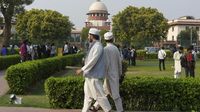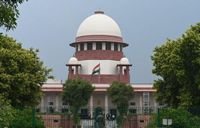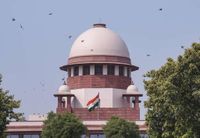The Supreme Court of India has granted the Centre a week to respond to petitions challenging the constitutional validity of the Waqf (Amendment) Act, 2025, while ensuring that existing waqf properties remain unchanged until the next hearing.
On Thursday, April 17, 2025, a three-judge bench led by Chief Justice of India Sanjiv Khanna, along with Justices PV Sanjay Kumar and KV Viswanathan, resumed hearings on the contentious legislation that has sparked significant debate across the country. The court has scheduled the next hearing for the week commencing May 5, 2025, and during this period, the status of waqf properties, including those classified as ‘waqf by user’, will not be altered.
The Supreme Court noted the Centre's assurance that no appointments would be made to the Waqf Council or Waqf boards until the next court date. Solicitor General Tushar Mehta, representing the government, stated that a preliminary response to the petitions would be submitted within seven days, along with relevant documentation.
During the previous day’s hearing, the court expressed concerns regarding several aspects of the Waqf Amendment Act, particularly the inclusion of non-Muslim members in the Waqf Council and Waqf Boards. The justices indicated they might issue an interim order to pause the operation of these provisions, emphasizing that the legislative changes should not affect properties already recognized as waqf by earlier court rulings.
Chief Justice Khanna remarked, "The government cannot rewrite history" in reference to the amendments that could potentially de-notify properties that have long been designated as waqf. This statement underscores the court's commitment to upholding historical decisions regarding property classification.
The Supreme Court is currently hearing a series of petitions, including one filed by Asaduddin Owaisi, leader of the All India Majlis-e-Ittehadul Muslimeen (AIMIM), challenging the Act's validity. Other petitioners include prominent figures and organizations such as Aam Aadmi Party leader Amanatullah Khan, the All India Muslim Personal Law Board (AIMPLB), and various regional political parties.
The Waqf (Amendment) Act, 2025, recently passed by Parliament, has stirred controversy due to its provisions that allow for the inclusion of non-Muslims in key waqf institutions. Critics argue that this undermines the integrity of waqf properties, which are intended to serve the Muslim community. The Supreme Court's decision to stay certain provisions of the Act reflects the judiciary's cautious approach to balancing legislative intent with constitutional mandates.
Solicitor General Mehta highlighted that the Waqf Act is a carefully considered piece of legislation and mentioned the numerous representations received regarding land classification as waqf. He argued that staying the entire Act would be a severe measure and sought a week to provide a comprehensive response.
In his remarks, Chief Justice Khanna reiterated the court's goal to maintain the existing status of waqf properties during the judicial review process. This approach aims to prevent any alterations that could arise from the implementation of the new Act while the matter is still under consideration.
As the hearings progress, the Supreme Court has directed that five petitions challenging the Waqf (Amendment) Act be treated as lead cases. These petitions will be consolidated under the common heading "In Re: Waqf Amendment Act 2025" for clarity and efficiency in proceedings.
The court's intervention comes at a time when the Muslim community and various civil rights organizations are closely monitoring the developments surrounding the Waqf Amendment Act. Many view the Act as a potential infringement on the rights of Muslims to manage their religious properties independently.
In addition to Owaisi and Khan, other notable petitioners include political leaders from various parties and civil rights advocates, each voicing their concerns about the implications of the new Act on waqf properties. The involvement of diverse political factions illustrates the widespread interest and contention surrounding this issue.
As the Supreme Court prepares for the next hearing, the legal landscape regarding waqf properties in India remains uncertain. The outcome of this case could significantly impact the governance of waqf properties and the rights of the communities they serve.
In summary, the Supreme Court's decision to grant the Centre additional time to respond, coupled with its assurance to maintain the status quo of waqf properties, reflects the judiciary's role in navigating complex legal and social issues. The upcoming hearings are anticipated to shed further light on the contentious aspects of the Waqf Amendment Act and its implications for the Muslim community in India.






